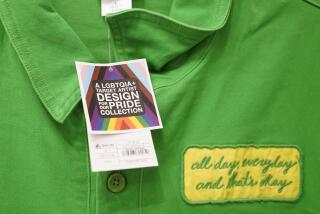Worn-out and fraying
- Share via
ABERCROMBIE & FITCH -- the hunting-goods store turned baby-tee and flip-flop purveyor -- confirms the old showbiz adage that no publicity is bad publicity. Year after year, Abercrombie creates its own controversy, solves it as quickly as possible and then reaps the benefits. This year’s brouhaha comes just in time for the holiday shopping season.
Earlier this month, a group of teenagers from Pittsburgh launched a “girlcott” against the retailer’s latest attempt at humor: a line of T-shirts featuring slogans meant to be sported across girls’ chests, such as, “Who needs brains when you have these?” and “Freshman 15” (a phrase usually denoting the number of pounds college freshmen can expect to put on) followed by the same number of male names. Other shirts proclaim the superiority of blonds.
In a matter of days, the girls landed on national television. Abercrombie quickly backpedaled, pulling two of the most offensive shirts off shelves while also reporting that October revenue shot up by 41% over October 2004.
The last time Abercrombie manufactured its own bad publicity was winter 2003, when its more-pornographic-than-usual Christmas catalog -- sold only to people over 18 -- raised a furor. After many protests, Abercrombie shelved the catalog and has since toned it down so that it is merely allusive rather than illustrative of what all-American youngsters might do while wearing their Cindy Rhinestone denim skirt or Feldspar Brook Crest fleece pullover. Within a month of pulling the catalog, Abercrombie reported its first same-store sales increase in several months.
Before that, in spring 2002, Abercrombie marketed T-shirts bearing images of Asians with hyperbolically slanted eyes and buck teeth, pulling rickshaws and doing dry-cleaning. The company pulled the shirts after protests -- and also reported increased quarterly sales. In 1998, the company printed a number of “creative drinking games” in, of course, its catalog. The article was cut from catalogs only after protests raised the company’s profile.
Anybody see a pattern?
Even after settling its most condemnable (and unplanned) controversy in November 2004 -- a discrimination lawsuit brought by female and minority employees and applicants who argued that they had been treated unfairly for not conforming to A&F;’s “all-American” ideal -- Abercrombie has reported double-digit increases in same-store sales almost every month to date.
So though the girls who protested A&F; won the battle, A&F; is winning the war. A little more than a week after settling with the girls, the company raised its annual profit outlook. Still, one has to wonder how long A&F; can keep going to the same well. At some point, its manufactured controversies are going to seem as predictable as the tinsel and snowmen that hit display windows every November.
More to Read
Inside the business of entertainment
The Wide Shot brings you news, analysis and insights on everything from streaming wars to production — and what it all means for the future.
You may occasionally receive promotional content from the Los Angeles Times.










